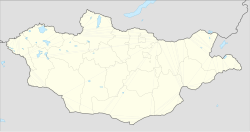
The subarctic climate is a climate characterised by long, usually very cold winters, and short, cool to mild summers. It is found on large landmasses, away from the moderating effects of an ocean, generally at latitudes from 50° to 70°N poleward of the humid continental climates. These climates represent Köppen climate classification Dfc, Dwc, Dsc, Dfd, Dwd and Dsd. In very small areas at high altitudes around the Mediterranean Basin, Iran, Kyrgyzstan, Tajikistan, Turkey, Alaska and other parts of the northwestern United States and Russian South-Eastern regions the climate is classified as Dsc with a dry summer climate, such as in Seneca, Oregon or Atlin, British Columbia.

Khovd is one of the 21 aimags (provinces) of Mongolia, located in the west of the country. Its capital is also named Khovd.

Choibalsan is the fourth-largest city in Mongolia after Ulaanbaatar, Darkhan, and Erdenet. The name of the city was Bayan Tümen until 1941, when it was renamed after the communist leader Khorloogiin Choibalsan. It is the capital of the province of Dornod. The city administrative unit's official name is Kherlen sum, with area of 281 square kilometres or 108 square miles. It is situated at the Kherlen River, at an elevation of 747 metres or 2,451 feet above sea level.

Dalanzadgad is the capital of Ömnögovi Aimag in Mongolia. It is located 540 kilometers (340 mi) south of the national capital Ulaanbaatar. The altitude of the city center is 1,470 meters.

A humid continental climate is a climatic region defined by Russo-German climatologist Wladimir Köppen in 1900, typified by large seasonal temperature differences, with warm to hot summers and cold winters. Precipitation is usually distributed throughout the year. The definition of this climate regarding temperature is as follows: the mean temperature of the coldest month must be below −3 °C (26.6 °F) and there must be at least four months whose mean temperatures are at or above 10 °C (50 °F). In addition, the location in question must not be semi-arid or arid. The Dfb, Dwb and Dsb subtypes are also known as hemiboreal.

Renchinlkhümbe is a sum of Khövsgöl aimag. The area is about 8,850 square kilometres (3,420 sq mi), of which 2,910 square kilometres (1,120 sq mi) are pasture and 35% are forest. In 2000, the sum had 4284 inhabitants, mainly Darkhad. The sum center, officially named Zöölön, is located 265 kilometres (165 mi) north of Mörön and 998 kilometres (620 mi) from Ulaanbaatar.
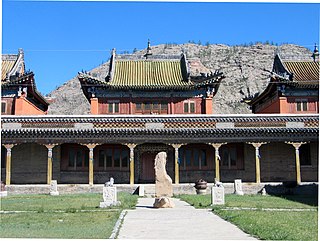
Tsetserleg, also transliterated as Cecerleg is the capital of Arkhangai Aimag (province) in Mongolia. It lies on the northeastern slopes of the Khangai Mountains, 360 miles (600 km) southwest of Ulaanbaatar. It has a population of 16,553, 16,618, 16,300.

Ulanhot, formerly known as Wangin Süm, alternatively Wang-un Süme, Ulayanqota in Classical Mongolian, and Wangyehmiao or Wangyemiao in Chinese prior to 1947, is a county-level city and the administrative center of Hinggan League in the East of Inner Mongolia autonomous region. Between the years 1947 and 1950, Ulanhot was the capital of Inner Mongolia Region. In 1950, the capital moved to Zhangjiakou and then again in 1952 it moved to Hohhot, which remains the capital to this day.

Baruunturuun is a sum in Uvs Province of Mongolia.

Galuut is a sum (district) of Bayankhongor Province in southern Mongolia.

Tsogt-Ovoo is a sum (district) of Ömnögovi Province in southern Mongolia. As of 2009 the population of the sum was 1,666, including 619 in the sum center. The area of the sum is 6,526 square kilometres (2,520 sq mi) and its population density is 0.26 people/km².

Tosontsengel is a sum of Zavkhan Province (aimag) in western Mongolia. It is the largest sum and sum centre in Zavkhan aimag after its capital.

Dulan County is a county of east-central Qinghai province, China. It is under the administration of Haixi Mongol and Tibetan Autonomous Prefecture.
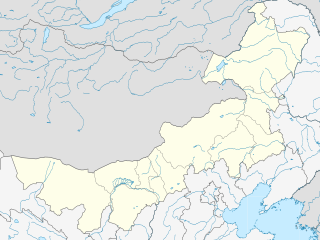
Darhan Muminggan United Banner is a banner of west-central Inner Mongolia, People's Republic of China. It is under the administration of Baotou City, 125 kilometres (78 mi) to the south-southwest.
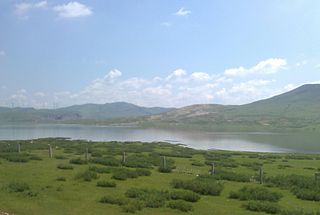
Jarud Banner is a banner of eastern Inner Mongolia, People's Republic of China. It is under the administration of Tongliao City, 150 kilometres (93 mi), and the China National Highway 304 passes through the area.

Genhe (Gegengol), formerly Ergun Left Banner or Ergun Zuoqi, is a city in the far northeast of Inner Mongolia, People's Republic of China. It is administratively a county-level city of Hulunbuir City.
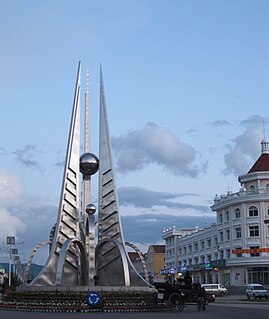
Arxan is a county-level city in the Hinggan League of northeastern Inner Mongolia in the People's Republic of China.

Abag Banner is a county of Inner Mongolia, People's Republic of China. It is under the administration of Xilin Gol League. Abag Mongols live here. The local dialect has variously been classified as Chakhar or Khalkha.

West Ujimqin Banner is a banner of Inner Mongolia, People's Republic of China. It is under the administration of Xilin Gol League.


